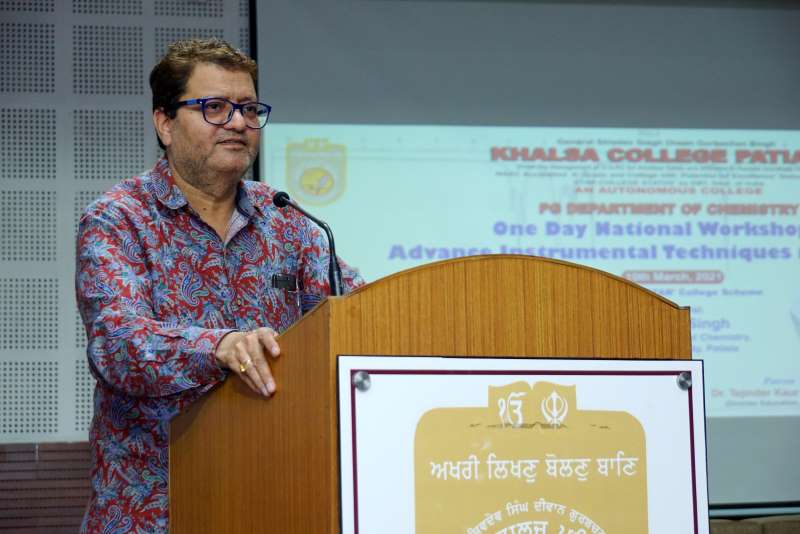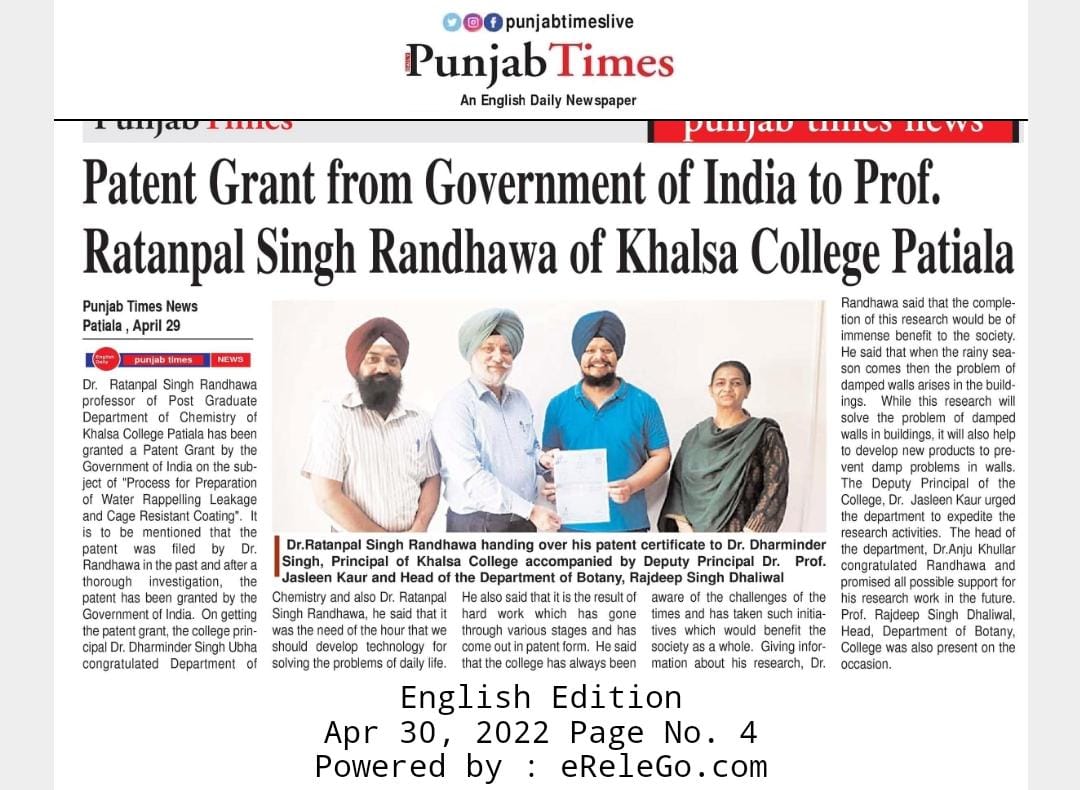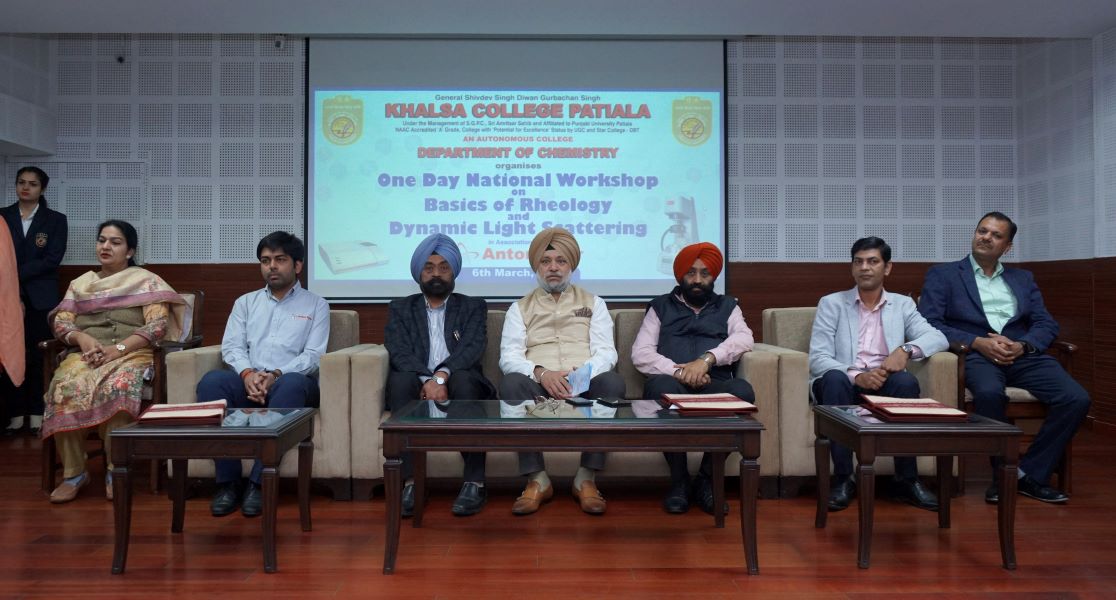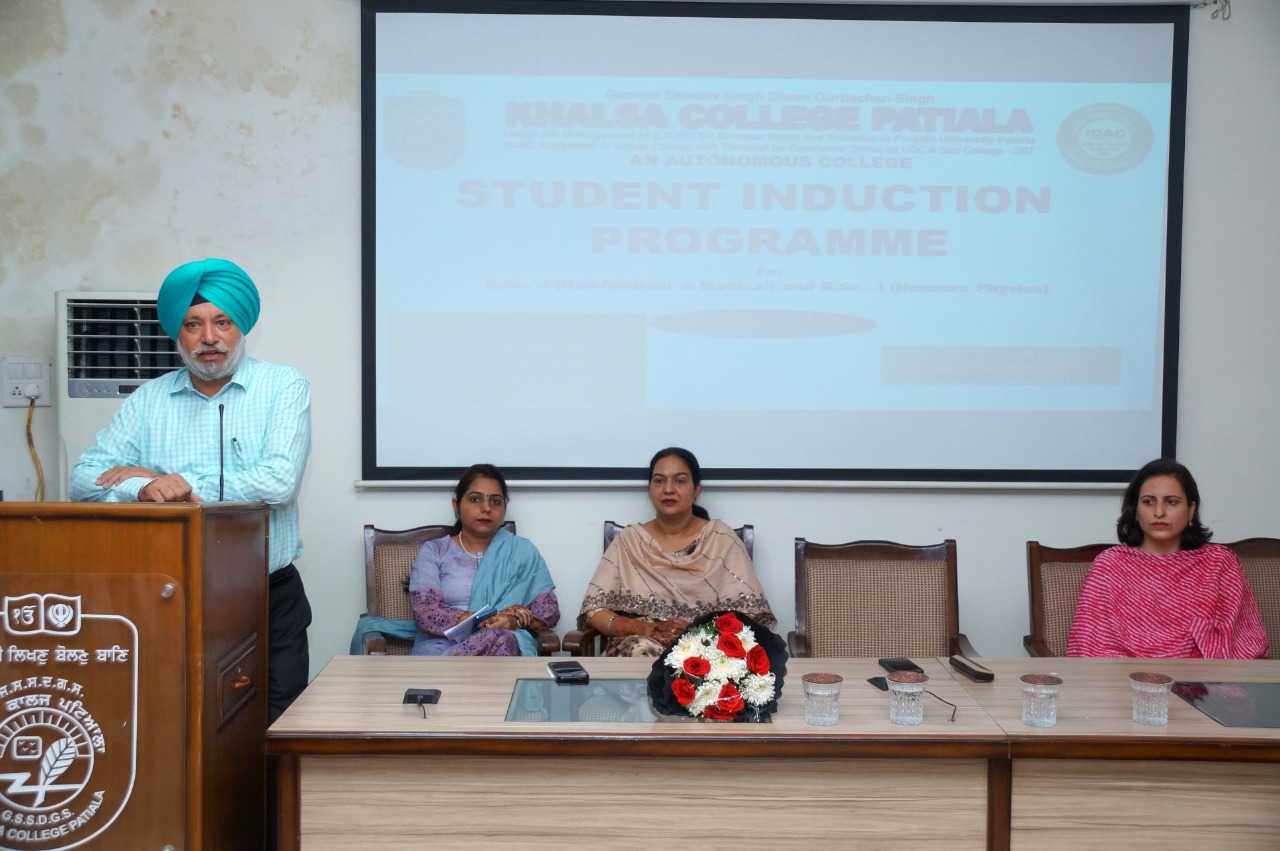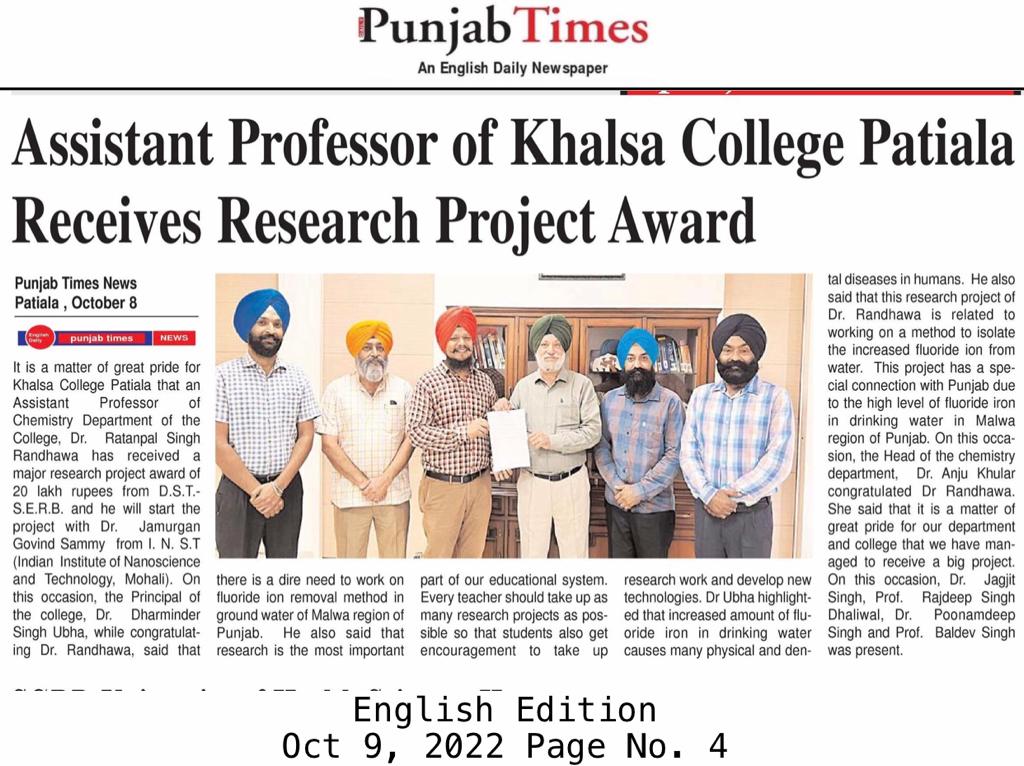About P.G.Department of Chemistry
The history of our Chemistry Department began in 1960, when G.S.S.D.G.S. Khalsa College was established. The Aim of the department of chemistry is to build a rich intellectual potential embedded with interdisciplinary knowledge, human values and professional ethics among the youth, so that they contribute to society and create a niche for a successful carrier. In the quest of academic excellence, the Department is dedicated in providing the best quality and up-to-date education for our students. We offer degree programmes at undergraduate and postgraduate level. The department offers Masters Degrees in Chemistry in three fields of specialisation (Inorganic, Organic and Physical chemistry) and undergraduate degree in B.Sc. Honors chemistry. Our college is the first one to start B.Sc. Honors chemistry course in Punjabi University. Beside academic activities, to create awareness about environment in students, chemistry department is organising various activities under green chem club. At the chemistry department we wish to provide our students the best possible learning environment to help them identify their career objectives, to express, organize, and implement their ideas individually as well as collectively.
These aims are served well by:
- Well equipped laboratories which are upgraded from time to time,
- A competent, hardworking, sincere faculty,
- An enthusiastic, forward looking, supportive management,
- Industrial visits of students from time to time,
- Encouraging students to participate in various national conferences and seminars.
We strive to enrich the teaching-learning process by way of
- Regular tests and assignments,
- External guest lectures by subject experts,
- Encouraging students to make presentations, organize seminars, and other activities.
The Department comprises of extremely well qualified and highly competent faculty members. Besides teaching, faculty has active, funded research projects that stretch this traditional structure to cover an exciting array of interdisciplinary research. Various faculty members have made significant contributions in coordination chemistry, polymer chemistry, organometallic chemistry, synthetic organic chemistry apart from the natural products, heterocyclic chemistry, and analytical chemistry. The faculty has published many research papers in reputed peer reviewed Journals. The Department has one patent to its credit
MEET THE FACULTY
P.G.Department of Chemistry
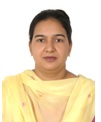
Dr. Anju Khullar
Associate ProfessorM.Sc., Ph. D.(Org. Chemistry)
SEE PROFILE
Dr. Monika Bansal
Assistant ProfessorNET, M.Phil., PhD
SEE PROFILE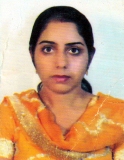
Dr. Rupy Dhir
Assistant ProfessorM.Sc., M.Phil., NET, Ph.D.
SEE PROFILE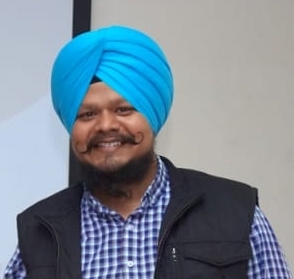
Dr. Ratan Pal Singh Randhawa
Assistant ProfessorMSc. Ph.D (Physical Chemistry)
SEE PROFILE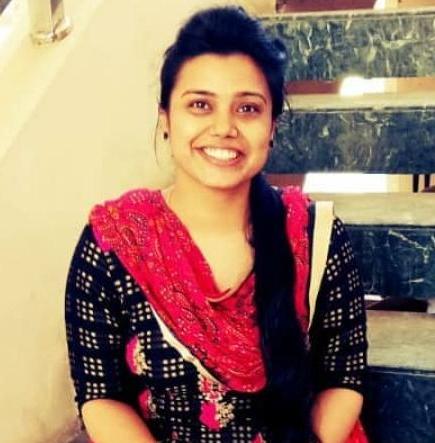
Dr. Heena Rekhi
Assistant ProfessorPhD
SEE PROFILECOURSES OFFERED
P.G.Department of Chemistry
M.Sc. Chemistry
Programme Outcomes (P.O.):
The course teaches advanced topics in chemistry. Experts from the academics and industry field have structured courses. It enables a student to have a detailed knowledge of inorganic, organic, physical, and analytical chemistry. After doing a master’s degree in chemistry, students can join further research and are also eligible for teaching Chemistry as well as for jobs in industries like pharmaceutical, biotechnology, and medical device companies. Most chemists use their research skills to formulate, produce, characterize, and analyze new compounds for specific applications. The chemists are mainly involved in finding new cures and discovering new molecules through a wide variety of techniques studied during the course. Many chemists start out in the lab and then move on to another laboratory career such as process chemistry, formulation chemistry, quality control, or quality assurance. They may also move to other careers such as teaching, regulatory affairs, project management, and production.
Programme Specific Outcomes (P.S.O.):
1. Students have the knowledge of basic concepts of inorganic, organic and physical chemistry. Students also acquire the knowledge of some concepts of mathematics, biology and computer which can be applied in chemistry.
2. To give students a comprehensive understanding of the principles of Chemistry.
3. To gain the skill to design and carry out scientific experiments and interpret the data.
Click here for Subjects/Course Details
B.Sc. (Hons) Chemistry
B.Sc Chemistry is a 3-year undergraduate course that deals with the fundamentals of Chemistry. This course aims to provide the aspirants with the foundation knowledge possible for a Science-based career.
Programme Outcomes (P.O.):
Upon completion of the B.Sc. (Honors) Chemistry students will be able to:
- Comprehend the adequate knowledge about the concepts, principles, and tools required for effective scientific and computer skills which the students can apply in individual and professional life.
- Gain a thorough and logical understanding in the fundamentals of Science and Computers for the holistic development of students.
- Demonstrate high standards of actuarial ethical conduct, professional behavior, interpersonal and communication skills as well as a commitment to lifelong learning through pure and applied sciences.
- Be initiated into the basics of scientific and applied research which will be helpful for the students to generate employability.
- Be equipped with practical exposure in the field of science and computers.
B.Sc. I
PSO1: Understand the basic concepts of inorganic chemistry, physical chemistry, organic chemistry, computer fundamentals, mechanics, electricity and magnetism.
PSO2: Demonstrate skills and competencies to conduct experiments based on simple instruments, acid-base & EDTA titrations, organic preparations, electricity, magnetism and data base management.
PSO3: Relate their knowledge and skills to carry out research oriented learning and to develop analytical problem solving approaches.
B.Sc. II
PSO1: Students will have a thorough knowledge of fundamentals of chemistry along with thermal physics, waves, optics and programming using C along with internet technologies.
PSO2: The foundation for the higher education such as M.Sc. in chemistry is developed, as inorganic, organic, physical and analytical chemistry are the foremost important branches of chemistry.
PSO3: Students will develop skills for conducting experiments on thermal physics, waves, optics, programming language, internet technologies & quantitative estimation using the different branches of volumetric analysis as well as quantitative analysis of metal ions and anions using gravimetric method.
B.Sc. III
PSO1: Students will learn about the advance topics of chemistry, instruments used in chemistry, chemicals of industrial importance and basics of green chemistry.
PSO2: Students will demonstrate knowledge of spectroscopy, biomolecules and catalysis to analyze a variety of chemical compounds and phenomenon.
PSO3: Students will show that they have learned laboratory skills, enabling them to analyse chemical in a chemistry laboratory and analyze the various materials for their chemical compositions.
(Click here for Subject/Course details)
DBT STAR College Scheme Lab manuals
DBT STAR College Scheme SOPs Practicals
https://docs.google.com/document/d/1f2uun3D8oOHSUYZ1Qu-L03P6nrhHr4vA/edit?usp=sharing&ouid=111964516028122435130&rtpof=true&sd=true
Certificate Couse (Three Months)
- Pharmaceutical Chemistry
OUR ACTIVITIES
P.G.Department of Chemistry
Important Links
P.G.Department of Chemistry
|
S No |
Patent Title |
Authors |
Patent No |
Date |
Country |
Status |
|
1 |
Process for crosslinking cellulose ethers under mild conditions |
Kundu, PP Singh, Ratan Pal |
9024011 B2 |
May 2015 |
US |
Granted |
|
2 |
Process of preparing water-repelling leakage and seepage resistant coating |
Ratan Pal Singh |
202011030227 A Patent No 395808 |
29/04/22 |
India |
Granted |
|
3 |
Method to develop ordered Nanoporous Biopolymers Membranes |
Ratan Pal Singh & Paramdeep Singh |
202111031757 A Patent No456498 |
4/10/2023 |
India |
Granted |
P.G Department of Chemistry
Academic Calendar 2022-2023
|
August |
|
|
September |
|
|
October |
|
|
November |
|
|
February |
|
|
March |
|
|
April |
|
Dr Anju Khullar https://scholar.google.com/citations?hl=en&user=d_JiatMAAAAJ
Dr Monika Bansal https://scholar.google.co.in/citations?view_op=list_works&hl=en&user=VxrcSYsAAAAJ
Dr Rupy Dhir https://scholar.google.com/citations?hl=en&user=4DeeXo8AAAAJ
Dr Ratan Pal Singh https://scholar.google.com/citations?user=lugqhjwAAAAJ&hl=en
Dr Heena Rakhi https://scholar.google.com/citations?hl=en&user=sIE64pUAAAAJ

Fourier-transform infrared spectrometer (FTIR)

UV-Vis Spectrophotometer with Peltier temperature Controller

0.1mg weighing balance

Ultrasonic Probe Sonicator

Dissolution Test Apparatus

Digital Melting Point Apparatus

Water Distillation System (DI Water)

Rotational Digital Viscometer
DBT Star College
Activities
|
Activity Name |
Date |
Activity Links |
|
Webinar |
20 Aug 2020 |
https://khalsacollegepatiala.org/dept/deptuploads/26/files/chem%20lect%20IIT%20Aug%2020.pdf |
|
Webinar |
22 Oct 2020 |
https://khalsacollegepatiala.org/dept/deptuploads/26/files/chem%20lect%20oct%2020.pdf |
|
Guest lecture |
27 Oct 2020 |
https://khalsacollegepatiala.org/dept/deptuploads/26/files/chem%20NIt%20Lect%20oct%2020.pdf |
|
Quiz |
11 Dec 2020 |
https://khalsacollegepatiala.org/dept/deptuploads/26/files/chem%20quiz%20dec%2020.pdf |
|
National workshop |
10 March 2021 |
https://khalsacollegepatiala.org/dept/deptuploads/26/files/chem%20workshop%2021march.pdf |
|
Student induction program |
23 Sept 2021 |
https://khalsacollegepatiala.org/activityreport/actname/activity?file=indu21 |
|
Student project |
15 March 2022 |
https://khalsacollegepatiala.org/dept/deptuploads/26/files/chem%20project%20march%2021.pdf |
Instruments Purchased Under DBT STAR College Scheme
|
S. No. |
Name of Equipment |
Number of Units |
||
|
1. |
Rotational viscometer |
01 |
||
|
2. |
Polarimeter |
02 |
||
|
3. |
Magnetic stirrer Remi 5MLH |
01 |
||
|
4. |
Stereo 200M microscope with 5.1MP camera |
01 |
||
|
5. |
Oil bath 250C digital with stirrer |
01 |
||
|
6. |
Electronic weighing scale |
02 |
||
|
7 |
Ultra -probesonicator |
01 |
||
|
8 |
Muffle furnace |
01 |
||
|
9 |
Visual melting range apparatus |
01 |
||
|
10 |
ANA Q U-007 water purification system |
01 |
||
|
11 |
Soxhlet extraction |
01 |
||
|
12 |
Magnetic Stirrer |
01 |
||
|
|
||||
Visual melting range apparatus
.jpg)
Probe Sonicator
.jpg)
VIscometer

Stereo-Microscope

Electronic weighing scale (2)
.jpg)
.jpg)
Polarimeter (2)

Oil bath 250C

Muffle furnace

Magnetic stirrer Remi (2)

Soxhlet extraction

Contact Us
P.G.Department of Chemistry
Dr Anju Khullar (HoD)
+91-8146377055
Dr Rupy Dhir
+91-9465208678

